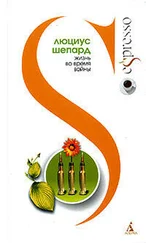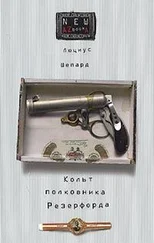Some time later—how much later, he could not be sure—a voice said, “Fucked up your hand pretty good, didn’tcha?”
The two pilots were standing by the cockpit door. In their black flight suits and helmets they looked neither weird nor whimsical, but creatures of functional menace. Masters of the Machine. “Yeah,” said Mingolla. “Fucked it up.”
“How’d ya do it?” asked the pilot on the left.
“Hit a tree.”
“Musta been goddamn crocked to hit a tree,” said the pilot on the right. “Tree ain’t goin’ nowhere if you hit it.”
Mingolla made a non-committal noise. “You guys going up to the Farm?”
“You bet! What’s the matter, man? Had enough of them wild women?” Pilot on the right.
“Guess so. Wanna gimme a ride?”
“Sure thing,” said the pilot on the left. “Whyn’t you climb on in front. You can sit back of us.”
“Where your buddies?” asked the pilot on the right.
“Gone,” said Mingolla as he climbed into the cockpit.
One of the pilots said, “Didn’t think we’d be seein’ them boys again.”
Mingolla strapped into the observer’s seat behind the co-pilot’s position. He had assumed there would be a lengthy instrument check, but as soon as the engines had been warmed, the Sikorsky lurched up and veered northward. With the exception of the weapons systems, none of the defenses had been activated. The radar, the thermal imager and terrain display, all showed blank screens. A nervous thrill ran across the muscles of Mongolia’s stomach as he considered the varieties of danger to which the pilots’ reliance upon their miraculous helmets had laid them open; but his nervousness was subsumed by the whispery rhythms of the rotors and his sense of the Sikorsky’s power. He recalled having a similar feeling of secure potency while sitting at the controls of his gun. He had never let that feeling grow, never let it rule him, empower him. He had been a fool.
They followed the northeasterly course of the river, which coiled like a length of blue-steel razor wire between jungled hills. The pilots laughed and joked, and the ride came to have the air of a ride with a couple of good oF boys going nowhere fast and full of free beer. At one point the co-pilot piped his voice through the onboard speakers and launched into a dolorous country song.
“Whenever we kiss, dear, our two lips meet, And whenever you’re not with me, we’re apart. When you sawed my dog in half, that was depressin’, But when you shot me in the chest, you broke my heart.”
As the co-pilot sang, the pilot rocked the Sikorsky back and forth in a drunken accompaniment, and after the song ended, he called back to Mingolla, “You believe this here son of a bitch wrote that? He did! Picks a guitar, too! Boy’s a genius!”
“It’s a great song,” said Mingolla, and he meant it. The song had made him happy, and that was no small thing.
They went rocking through the skies, singing the first verse over and over. But then, as they left the river behind, still maintaining a northeasterly course, the co-pilot pointed to a section of jungle ahead and shouted, “Beaners! Quadrant Four! You got ’em?”
“Got ’em!” said the pilot. The Sikorsky swerved down toward the jungle, shuddered, and flame veered from beneath them. An instant later, a huge swath of jungle erupted into a gout of marbled smoke and fire. “Whee-oo!” the co-pilot sang out, jubilant. “Whisperin’ Death strikes again!” With guns blazing, they went swooping through blowing veils of dark smoke. Acres of trees were burning, and still they kept up the attack. Mingolla gritted his teeth against the noise, and when at last the firing stopped, dismayed by this insanity, he sat slumped, his head down. He suddenly doubted his ability to cope with the insanity of the Ant Farm and remembered all his reasons for fear.
The co-pilot turned back to him. “You ain’t got no call to look so gloomy, man,” he said. “You’re a lucky son of a bitch, y’know that?”
The pilot began a bank toward the east, toward the Ant Farm. “How you figure that?” Mingolla asked.
“I gotta clear sight of you, man,” said the co-pilot. “I can tell you for true you ain’t gonna be at the Farm much longer. It ain’t clear why or nothin’. But I ‘spect you gonna be wounded. Not bad, though. Just a goin’-home wound.”
As the pilot completed the bank, a ray of sun slanted into the cockpit, illuminating the co-pilot’s visor, and for a split-second Mingolla could make out the vague shadow of the face beneath. It seemed lumpy and malformed. His imagination added details. Bizarre growths, cracked cheeks, an eye webbed shut. Like a face out of a movie about nuclear mutants. He was tempted to believe that he had really seen this; the co-pilot’s deformities would validate his prediction of a secure future. But Mingolla rejected the temptation. He was afraid of dying, afraid of the terrors held by life at the Ant Farm, yet he wanted no more to do with magic… unless there was magic involved in being a good soldier. In obeying the disciplines, in the practice of fierceness.
“Could be his hand’ll get him home,” said the pilot. “That hand looks pretty fucked up to me. Looks like a million-dollar wound, that hand.”
“Naw, I don’t get it’s his hand,” said the co-pilot. “Somethin” else. Whatever, it’s gonna do the trick.”
Mingolla could see his own face floating in the black plastic of the co-pilot’s visor; he looked warped and pale, so thoroughly unfamiliar that for a moment he thought the face might be a bad dream the co-pilot was having.
“What the hell’s with you, man?” the co-pilot asked. “You don’t believe me?”
Mingolla wanted to explain that his attitude had nothing to do with belief or disbelief, that it signaled his intent to obtain a safe future by means of securing his present; but he couldn’t think how to put it into words the co-pilot would accept. The co-pilot would merely refer again to his visor as testimony to a magical reality or perhaps would point up ahead where—because the cockpit plastic had gone opaque under the impact of direct sunlight—the sun now appeared to hover in a smoky darkness: a distinct fiery sphere with a streaming corona, like one of those cabalistic emblems embossed on ancient seals. It was an evil, fearsome-looking thing, and though Mingolla was unmoved by it, he knew the pilot would see in it a powerful sign.
“You think I’m lyin’?” said the co-pilot angrily. “You think I’d be bullshittin’ you ’bout somethin’ like this? Man, I ain’t lyin’! I’m givin’ you the good goddamn word!”
They flew east into the sun, whispering death, into a world disguised as a strange bloody enchantment, over the dark green wild where war had taken root, where men in combat armor fought for no good reason against men wearing brass scorpions on their berets, where crazy, lost men wandered the mystic light of Fire Zone Emerald and mental wizards brooded upon things not yet seen. The co-pilot kept the black bubble of his visor angled back toward Mingolla, waiting for a response. But Mingolla just stared, and before too long the co-pilot turned away.
One morning nearly five hundred years after the September War, whose effects had transformed the Amazon into a region of supernal mystery, a young man with olive skin and delicate features and short black hair awoke to find himself lying amid a bed of ferns not far from the ruined city of Manaus. It seemed to him that some great darkness had just been lifted away, but he could recall nothing more concrete of his past, neither his name nor those of his parents or place of birth. Indeed, he was so lacking in human referents that he remained untroubled by this state of affairs and gazed calmly around at the high green canopy and the dust-hung shafts of sun and the tapestry of golden radiance and shadow overlying the jungle floor. Everywhere he turned he saw marvelous creatures: butterflies with translucent wings; birds with hinged, needle-thin beaks; snakes with faceted eyes that glowed more brightly than live coals. Yet the object that commanded his attention was a common orchid, its bloom a dusky lavender, that depended from the lowermost branch of a guanacaste tree. The sight mesmerized him, and intuitions about the orchid flowed into his thoughts: how soft its petals were, how subtle its fragrance, and, lastly, that it was not what it appeared to be. At that moment, as if realizing that he had penetrated its disguise, the bloom flew apart, revealing itself to have been composed of glittering insects, all of which now whirled off toward the canopy, shifting in color like particles of an exploded rainbow; and the young man understood—a further intuition—that he, too, was not what he appeared.
Читать дальше






